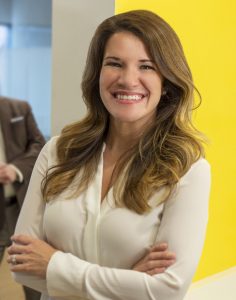|
With touchpoints across all phases of the CPA lifecycle, Shelly Crosby, Manager, Licensing Services, NASBA, has a unique position that allows her to interact with CPA Exam candidates and CPAs, from beginning to end of the lifecycle. As manager of Licensing Services, she assists individuals on projects related to CPA examination, licensure and compliance, and works hard on making sure candidates know there are more pieces to the puzzle of becoming a CPA than just passing the CPA Exam. We recently interviewed Crosby on what resources are most valuable to CPAs and CPA candidates and much more. See what she had to say! We heard working at NASBA runs in the family! Who introduced you to NASBA? I was introduced to NASBA by my grandmother in 2004 while searching for my first job after college. She was the executive assistant to a former CFO of NASBA. Initially, I was hired as the CredentialNet/Colorado Licensing Coordinator. I then moved into various roles specializing in CPA firm registrations, onboarding new licensing states, website/database management and eventually into a management position. Describe your current role? Now, my role is to manage operations for the Licensing Services Department. Our department currently provides examination, licensing and compliance administrative services to 11 client boards. I oversee daily operations of the department and ensure all contractual obligations are met. I also serve as a liaison between my client boards and NASBA. To a CPA or CPA candidate, what platforms do you work with that they would recognize? I deal with many aspects of the CPA lifecycle, as my department handles examination, licensure and compliance. I regularly work with CPA Central, which is the online application for the Exam, myCPAlicense.org, the online application for licensing, and the CPE tracking tool. What project are you working on that you think CPA candidates will benefit from most? A project we are working on and the one I am most excited about, is a project that will integrate the CPA Examination System with the CPA Licensing/Renewal System. This integration will create a new “CPA Central.” Once complete, CPA candidates will have a one stop shop portal for all their CPA needs – from CPA Examination Advisory Evaluations to CPE Audits and everything in between! The system will feature user accounts, online applications, document upload and retention capability, reporting, license management functions, renewal tracking, etc. All data collected by NASBA for an individual will now be housed in one, centralized record that can be transmitted to a state board electronically, as needed. In your role, what questions do you get most from CPAs and CPA candidates? CPA Candidates: We often get the question, “How do I become licensed?” Most candidates fail to realize that the CPA Exam is a licensure exam, so there are additional requirements for licensure that they don’t realize they need on the front end. As a result, many candidates must go back to school to fulfill certain licensure requirements post Exam. CPAs: The question my department often receives is, “Do I need a CPA license?” This refers to CPAs wondering about mobility and different state licensure requirements. For individuals who also have this question, they should check cpamobility.org and/or contact their state board directly. What resource(s) do CPAs have access to that are underutilized (you wish more CPAs would use them)? 1. ALL – The Accountancy Licensing Library (ALL) is the only online resource for comprehensive and reliable CPA licensing information for every state in one place. What is one of the biggest concerns or struggles you see with CPA candidates, and what advice do you have for them? The biggest struggle I see from candidates is their understanding of the lifecycle of a CPA, and that taking the CPA Exam is just one step toward becoming a CPA. It’s so important that CPA candidates do their research on the front end and familiarize themselves with the requirements of the Board of Accountancy in which they intend to be licensed. For CPAs, what is one thing you would like to tell them about the CPA licensure process, or maybe something that they tend to forget about? It’s important for CPAs to realize that requirements for CPA licensure differ between all 55 jurisdictions, so just because you are licensed in one jurisdiction does not mean you qualify for the next, and regulatory rules are subject to change at any time. To connect with Shelly Crosby, find her on LinkedIn. |

